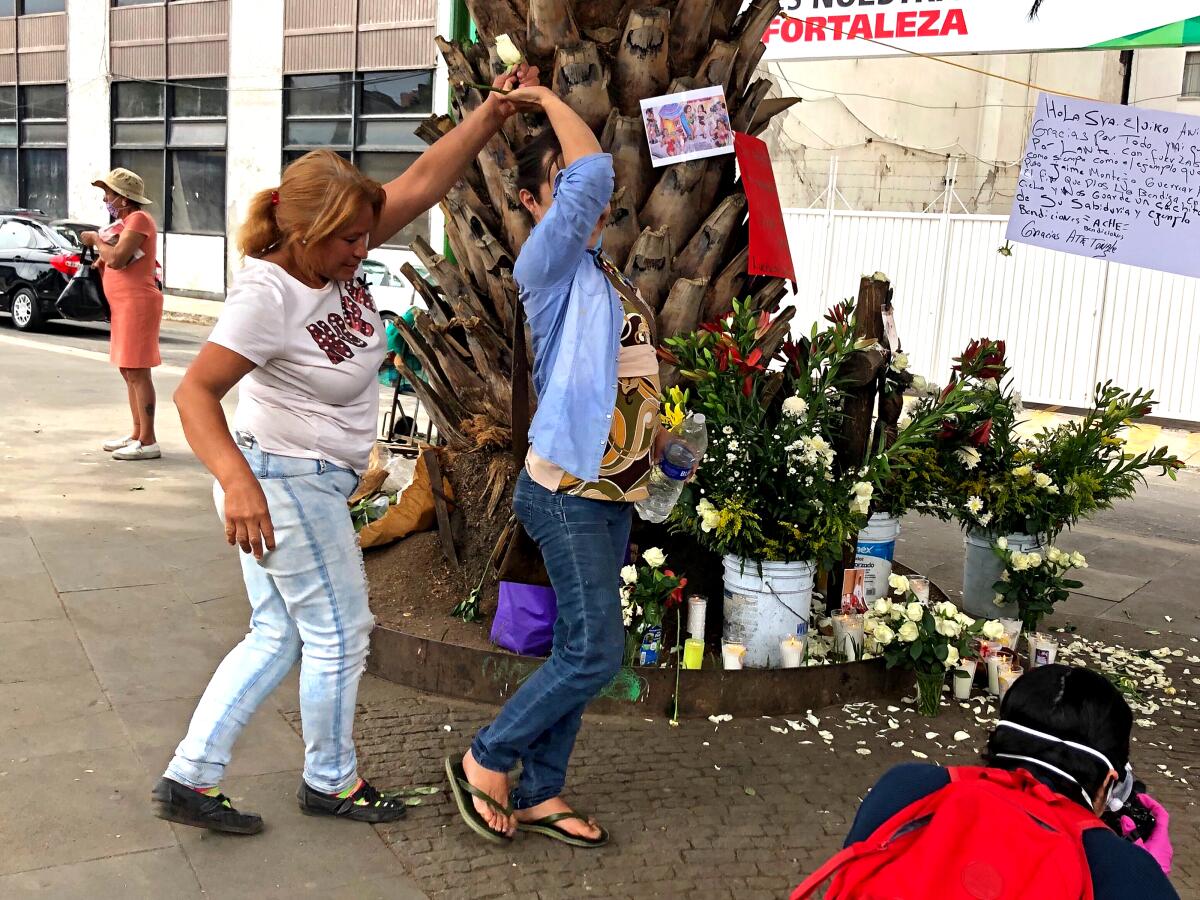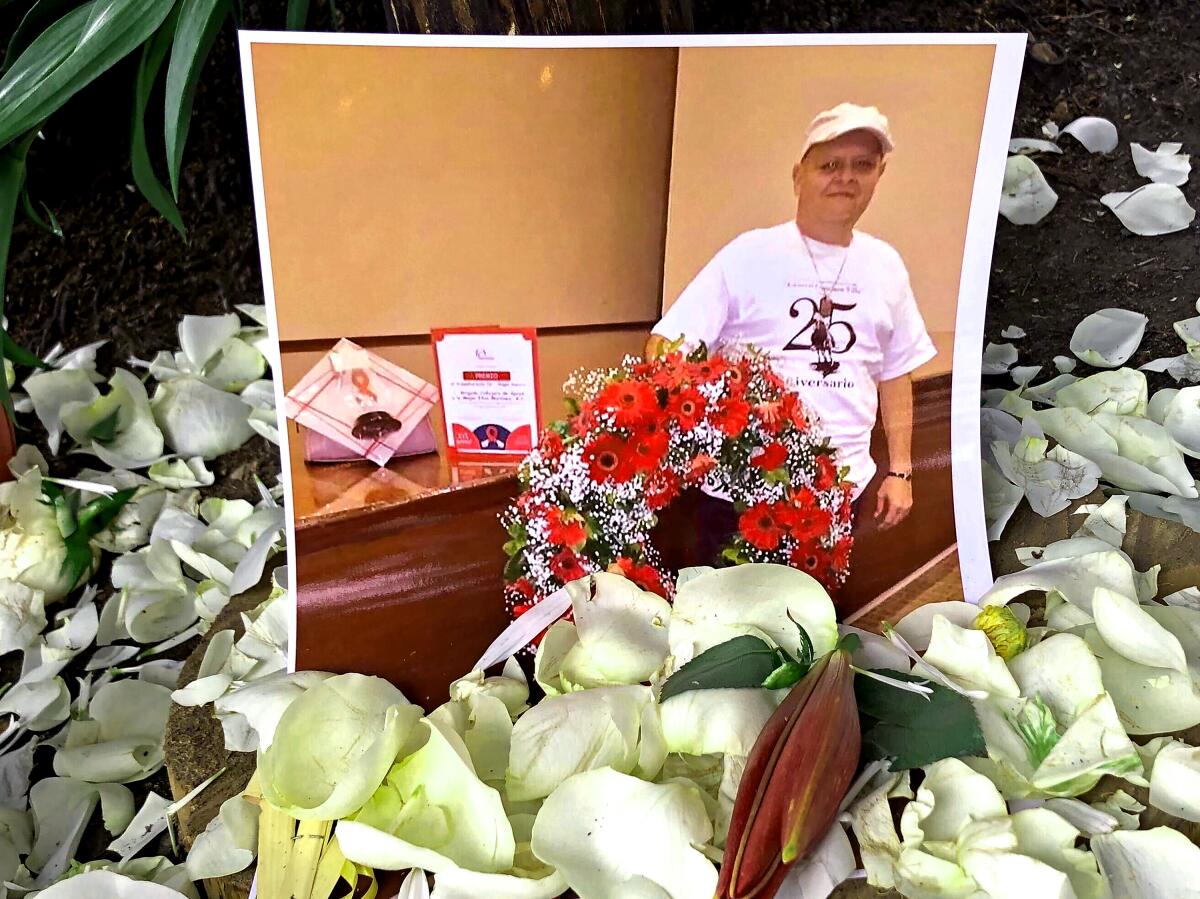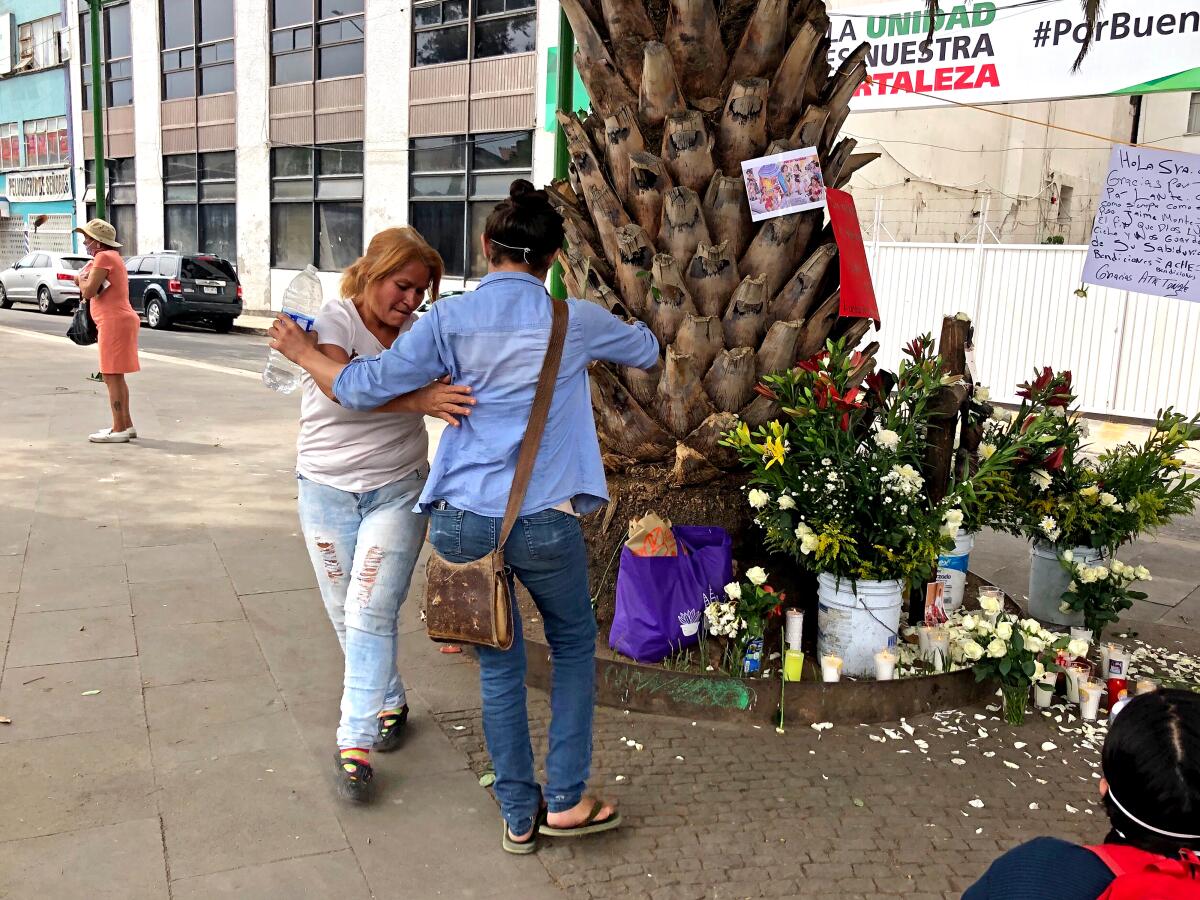He fought to protect sex workers from COVID-19 and much more. Then the virus came for him

- Share via
Mexico City — On a cloudy afternoon this week, a few dozen sex workers gathered outside a subway station in downtown Mexico City to remember their longtime leader.
Wearing surgical masks to protect against the coronavirus, the women prayed and sang and lighted candles around a photo of Jaime Montejo, who had devoted his life to giving these women a measure of dignity.
“He fought for us,” said Carla Enriquez Perez, who cried as she handed a white rose to each new arrival. “He fought for us until the very end.”
Just a few weeks ago, Montejo was here helping workers who had seen the sex trade dry up almost overnight because of the pandemic.
In the past, a worker might have had 10 paying clients on a good day. But that had dropped to one or two or none at all.
Unable to afford the $5-a-night hotels where they had previously resided, dozens of women were forced onto the streets. About 70 of them began living together in a makeshift camp near the subway station.
Montejo and co-workers from his nonprofit brought the women meals and face masks and tarps so that they would be sheltered from the rain.
The activists distributed pamphlets with drawings that showed how workers could protect themselves while having sex with clients. They called it the “Coronasutra.”
It was not the first time that he had sought to assist the neediest in the face of a mysterious and deadly contagion.

Montejo was a college student in 1989 when he embarked on a research project in Mexico City’s red light district with a sociology professor who studied prostitution.
It was the early days of the HIV/AIDS crisis, and sex workers were falling ill and dying while also navigating the dangerous world of johns, pimps and police. Montejo wanted to know how he could help.
The professor told them he couldn’t, explaining that the academics were supposed to only observe.
That wasn’t enough for Montejo or two of his fellow students, sisters Elvira and Rosa Icela Madrid.
After graduating from the National Autonomous University of Mexico, they embedded in the neighborhood, a warren of market stalls known as La Merced, and began advocating for sex workers.
They helped the women file police reports when they were attacked or extorted for bribes, and opened health clinics that offered free condoms and testing for sexually transmitted diseases.
In 1993, Montejo and the Madrid sisters officially formed the nonprofit Street Brigade to Support Women Elisa Martínez, named in honor of a sex worker who died of complications of AIDS.
The activists thought it was important to parse the differences between sex workers who had entered that line of work on their own accord and those who had been forced into it.
Women with bruises on their bodies or who had to pay pimps “are probably not living peaceful lives,” Montejo said in an interview with a Mexico City journalist. But there were others who had chosen it as a viable way to earn a living, and the group insisted that their labor should be viewed as a legitimate work.
The group held annual street marches, widely covered in the media, where Montejo and the Madrid sisters led participants in chants.
“Total respect for sex work!” they shouted.
“Who does the corner belong to? The people who work there!”
In 2014, the group celebrated a victory when a Mexico City judge ruled that prostitutes should be recognized as nonsalaried workers, allowing them to access certain government benefits.
Last year, its members rejoiced again when Mexico City lawmakers removed of a clause in the city code that in effect decriminalized prostitution.
Montejo fell ill in late April. A few days later, he was taken to a public hospital where he was treated for COVID-19.
He died early Tuesday morning at age 56.
At the memorial Tuesday, several sex workers recalled how Montejo had made their difficult lives much more bearable.
“The police used to take us to jail,” said Dulce María Martinez Hernandez, who has been working on the street for decades. “I once stayed there 15 days.”

“We were very discriminated against,” said Laura Gonzalez, a 61-year-old transgender woman who said she was kicked out of her home at age 14 for wearing girl’s clothing. “But he gave us respect.”
Gonzalez, homeless for the last month, had put on her best outfit, a tattered peach dress. As friends approached, she reached out to hug them.
A young woman stood up on a bench and implored the mourners to “maintain a healthy distance.”
“We can’t do a funeral and we can’t give hugs as is our custom as Mexicans,” she said.
Instead, the woman encouraged mourners to write messages to Montejo and the Madrid sisters, especially Elvira, Montejo’s longtime romantic partner who is also thought to have the coronavirus and was at home in quarantine.
Somebody put on music -- first a Colombian cumbia and then a traditional Mexican norteño song about an angel who visits Earth and then departs.
Several women began to dance. Others shouted slogans.
“Who does the corner belong to?” they chanted. “The women who work there!”
More to Read
Sign up for Essential California
The most important California stories and recommendations in your inbox every morning.
You may occasionally receive promotional content from the Los Angeles Times.











